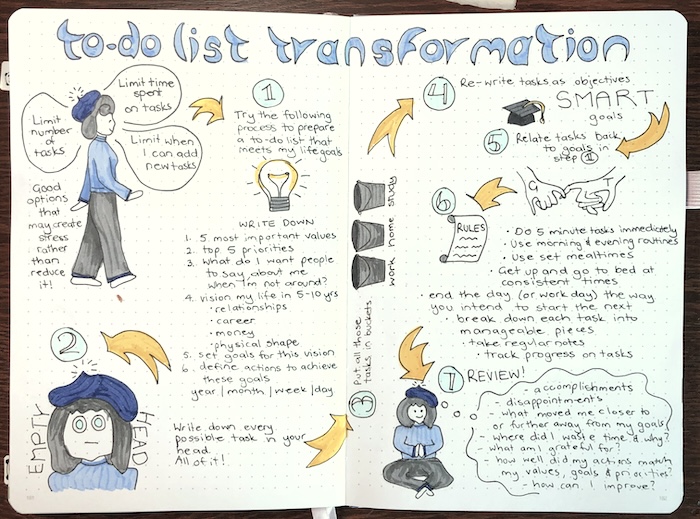This time I read To-do list transformation by Henry Bergen.
This book helped me form my approach for goal setting and task management in 2022, with a few tweaks based on some other books I’ve read. I enjoyed creating an infographic so much in the last book, that I created another to describe what I learnt from Bergen’s book. The infographic below does not describe exactly what Bergen recommends as an approach, but was my interpretation of his methods.
From what I read, I came up with a sequential process that focused on achieving the main lesson of the book; that your tasks should relate to your goals and have meaning, because this would help you remain motivated to complete them.

Rather than jumping straight into writing down your goals, which is what I did in 2021, rather, you work out your values and priorities and your vision for the next 5-10 years. This in itself was a very challenging process for me! Your goals are then based on your values, priorities and vision, which makes so much sense that you wonder why you haven’t done it before. The final step in this first stage is to define the actions that you think will help you achieve your goals.
Next, we empty our heads of all the tasks, big and small, no limits. A big old brain dump. Sort these into ‘buckets’ so that they’re grouped a little. For instance, some might relate to generally caring for your family, or being present for work, others may relate to study or a gardening project. These tasks are then written as SMART tasks. Many will have heard of SMART tasks before. It’s critical to write them out in this way because this stops you writing down vague tasks with no end date. Instead, they should be specific, measureable, achievable, relevant and timely. This means rather than saying you want to learn how to repair a car, you say I want to be able to carry out basic maintenance and repairs on my car on my own by completing a car mechanics short course at the local college in February. I’ve been specific about what I want to do, how I want to learn, where, it’s achievable, relevant because I need to be self-reliant on long trips, and I’ve said when I will do it.
Now the most important step for Bergen, was relating these tasks back to your goals. He goes as far as to say you should re-think doing tasks that don’t relate to your goals because – why do it then? Throughout the book there are lots of suggestions about how to get your tasks done, and then he finishes with recommending regular reviews of your tasks and goals to make sure they are still relevant.
This book had such a positive impact on me, I’ve incorporated it into planning at the beginning of my new journal, which I’ll share soon!
